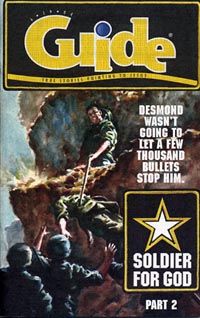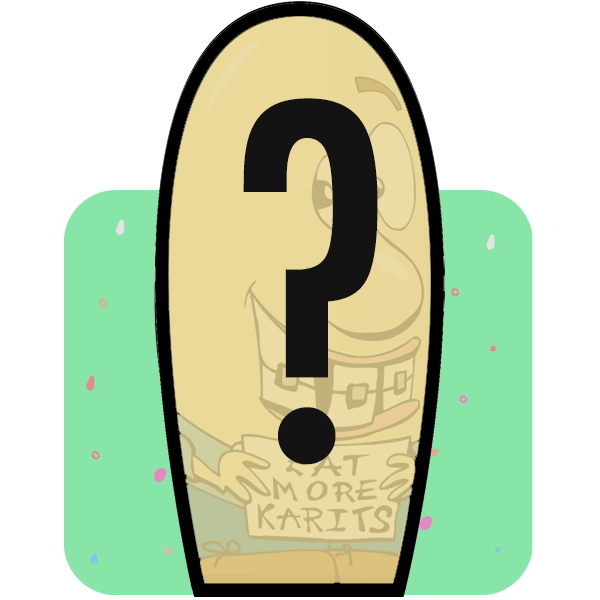“Hey, look at the preacher!” a sarcastic voice shouted across the wide wooden Army barracks at Fort Jackson, South Carolina. Company D’s new recruits turned and stared at a young, slender figure kneeling beside a low bunk. The soldier’s mouth moved silently as he prayed.
“He’s probably asking God to get him out of the Army!” another called. Laughter erupted from the crowd of men in green fatigues.
Suddenly a heavy Army boot sailed over the praying man’s bunk and smashed into a metal cabinet standing against the wall. More shoes arched through the air, accompanied by a foul stream of mocking remarks.
The mournful strains of taps quieted the assault as men flopped into bed. The lonely recruit with the dark wavy hair whispered an emotional amen and slipped under the thin olive-drab blanket. Private Desmond T. Doss’s first day in the United States Army had ended.
The year was 1942. Desmond Doss was a Seventh-day Adventist–had been all his young life. He’d grown up on Bible stories of men and women who had stood up for their religious beliefs, even in the face of danger and death. But never had he thought he’d be called upon to demonstrate his faith so boldly.
Japan’s attack on Hawaii’s Pearl Harbor in December 1941 had thrown the United States into World War II. Doss had reported immediately upon receiving his draft notice. “I’ll be happy to serve my country,” Desmond told the military officer signing him in, “but I will not carry a gun. Let me work as a medic to treat wounded men on the battlefield.”
He quickly learned how to use whatever material was at hand to form splints for broken arms and legs. He was taught how to administer blood plasma in the thick of battle, what to do for shock, and when to provide water to the injured. But hard work and dedication weren’t enough to appease his tormentors.
“You guys are all alike,” a sarcastic sergeant jeered one day. “You talk big about religious freedom, but when your country needs you to help protect that freedom, you chicken out.”
“I love this country just as much as you do, Sergeant,” Desmond responded respectfully. “I just refuse to kill, that’s all.”
There was another reason for Doss’s unpopularity. He insisted on keeping the fourth commandment.
“Now what?” his superior groaned as the youthful non-combatant approached with a smart salute.
“Sir, I’d like to attend church services this Saturday, as my beliefs dictate.”
“Saturday!” The man chuckled. “You’re a little confused, Private. The Army already allows its fighting force time off on Sunday.”
“I understand, sir,” the slender recruit pressed. “But I believe in the Bible Sabbath. That’s the seventh day of the week, Saturday. God asks us to keep it holy by worshiping Him and refraining from all work. I’ll be happy to do double duty on Sunday.”
Reluctantly the man issued the Saturday pass to Desmond. In the battle of wills between the United States Army and Private Desmond T. Doss, someone would have to back down. And it wouldn’t be Desmond.
Reveille pierced the hot morning air. “Rise and shine, you mama’s boys,” the sergeant roared. “Today we’ve got 25 miles of full field-pack marching waiting for your enjoyment.”
“Hey, Preacher, you’ve got it made,” a familiar voice growled as the men assembled on the training ground. “No rifle, no ammo–maybe you can stop and pick some flowers along the way.” Doss grinned but didn’t bother to respond. His two canvas first-aid kits matched a rifle’s weight and were twice as awkward. His Christian beliefs were cutting him no slack this day.
The march began. Soon sweat caused field uniforms to stick to their wearers like moist glue. As midday approached, the soldiers staggered like zombies, eyes red, faces pale. Suddenly a man fell. Desmond rushed to his side. His instructor’s words echoed in his ear. “Clammy skin. Pulse barely readable. That’s heat prostration.” Doss made the victim as comfortable as possible and turned him over to the ambulance that followed some distance behind. Then he had to run to catch up with his company.
High noon brought a lunch break. K-rations quickly disappeared down hungry throats. As Desmond took his first bite, another soldier slumped under a small tree and called for help. The man was examining a large blister on his heel. “Do something,” he pleaded.
“I’ll try,” Desmond reassured his comrade. He quickly pricked the blister with a sterile needle, doused the injured area with Merthiolate, then dressed it tightly with gauze. As he was finishing, another voice called out for help. Then another. Injuries kept Desmond hopping during the break and for the entire return trip. Despite his running around, he finished the march with the platoon. Even while lined up waiting for dismissal, three men passed out cold. Desmond hurried to their aid.
Later all the soldiers were in their bunks with their shoes off. Desmond Doss still didn’t rest. He checked every foot. That morning some had jeered him, calling him names. Now, lying exhausted, they watched the soft-spoken medic kneel by their bunks and treat their feet.
“Hey, Preacher,” one said, respect in his voice, “you’re OK.” The jeering stopped, replaced by hesitant words of thanks and friendship. For Desmond Doss and the other members of Company D, the future would hold another test. On a distant Pacific island, Okinawa, unimagined horrors waited.
Reprinted from Randy Fishell, editor, Guide’s Greatest Stories (Review and Herald Publishing Association, 1994).
Written by Charles Mills
Illustrated by Mark Texiera


